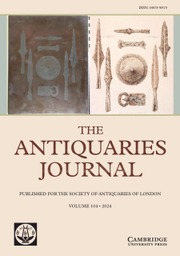Article contents
A Prehistoric Invasion of England
Published online by Cambridge University Press: 08 January 2012
Extract
In his account of the leaf-shaped bronze swords of the Hallstatt period, the late M. Déchelette wrote: ‘Doubtless one might ask whether this weapon might not have been brought to the British Isles by the first Celtic invaders, but that is purely conjectural (une conjecture fragile), for it is difficult among the British finds the same period to detect any really characteristic analogies’ (vol. ii, pt. 2, p. 724). The same paragraph points out that bronze swords of identically the same type have been found in regions as widely separated from each other as Scandinavia, Bohemia, and Ireland, to which one might add Finland and Southern France. The conclusion is irresistible that these swords were derived from a common centre of dispersal, and that they were not evolved independently in each region. Had the evolution taken place locally there might have been similarity, but not identity of type. I propose to bring forward evidence in support of the hypothesis that, towards the close of the Bronze Age, the British Isles were invaded by the first wave of Celtic-speaking peoples, bringing with them leaf-shaped bronze swords, many other entirely new types of bronze objects, and at least two types of pottery new to these islands and evolved somewhere on the Continent. I suggest that these invaders may have been Goidels, arriving about 800–700 B.C. Possibly the new types under review may not all be strictly contemporary; and there may have been more than one wave of invasion. But there can, I think, be no doubt that an invasion on a large scale took place at about this time.
- Type
- Research Article
- Information
- Copyright
- Copyright © The Society of Antiquaries of London 1922
References
page 27 note 1 In vol. ii (Hallstatt), p. 588, note 1, he says: ‘The date of the first invasion of Britain recognized by Celtic scholars—the Goidelic invasion—is so uncertain that one cannot determine the type of sword used by these first conquerors.’
page 28 note 1 To be published in Archaenlogla, lxxi.
page 28 note 2 By an exotic object is meant one highly specialized in character whose early forms are not found in Great Britain.
- 5
- Cited by


